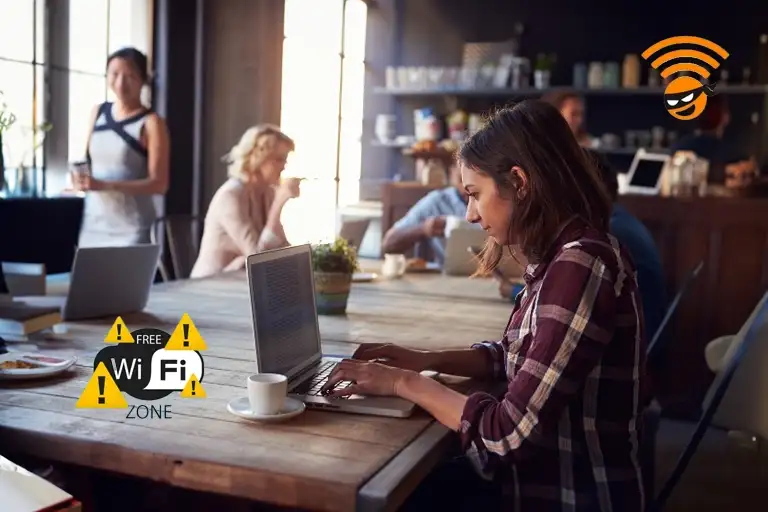Stay Safe Using Public Wi-Fi
As the digital workforce continues to expand, more people are dependent on public WiFi than ever before. Whether it’s the local coffee shop or co-working space, the availability of an internet connection wherever we go has helped foster a growing segment of remote employees.
Using public WiFi is a quick and often free way to browse the web without eating away at your data plan, but it’s important to remain mindful when connecting to these networks.

A public Wi-Fi network is fundamentally less secure than your personal, private one because you don’t know who set it up, or who else is connecting to it. It is better to use your smartphone as a hotspot instead.
How To Stay Safe On Public Wi-Fi?
Here are the ways to stay safe on public Wi-Fi networks:
Turn Off File Sharing Features:
When you’re on a public network around strangers, you’ll want to cut off the features that enable frictionless file sharing on your devices. On a PC, that means going to the Network and Sharing Centre, then Changing advanced sharing settings, then turning off file and printer sharing. For Macs, go to System Preferences, then Sharing, and unselect everything. Then head to the finder, click on Airdrop and select Allow me to be discovered by No One. For iOS, just find Airdrop in the Control Centre and turn it off.
Choose Wisely:
It’s likely your local shop, grocery store, and even your gym have public WiFi networks available for guests. While hopping on these networks during your visits can often be perfectly safe, be a worry when visiting less-established locations. Before choosing a network to connect to, it’s wise to think twice about your location. It’s true that no public Wi-Fi is completely secure, but choosing wisely and trusting your judgment are always good tips to remember.
Turn Wi-Fi Off When Not In Use:
One of the basic rules of security is that if you don’t need something connected to a network, don’t connect it. When you’re finished working online, turn Wi-Fi off on your laptop, tablet, or smartphone. It’ll also save your battery. It’s easy to do in Mac OS, and in Windows, you can even set your laptop to automatically turn Wi-Fi back on after a short time offline.
Visit Secure Sites:
While you’re using public Wi-Fi, it’s also a great practice to make sure you’re only visiting sites with encrypted connections. An encrypted connection is safer than an unencrypted page and makes spying on your web activity much more difficult for potential hackers. To easily spot an encrypted site, check for, “HTTPS://” before any link in the URL search bar. An unencrypted site can be identified by displaying, “HTTP://” before the following URL.
When Possible, Avoid Financial Transactions:
One of the riskiest things you can do while connected to a public Wi-Fi network is to complete a financial transaction. Things, like paying online and accessing your bank account over an unsecured public Wi-Fi network, are a shortcut to being hacked.
As here already mentioned, many public Wi-Fi networks have susceptibilities that make it easy for hackers to intercept your data
Keep Your Antivirus and Antimalware Active:
If you ever use public or untrusted networks, make sure your computer is running some kind of antimalware utility and complementary antivirus utility as well.
We can use Avira for Windows and Sophos for Mac OS.
Use A VPN:
One of the best ways to protect yourself online, both on public Wi-Fi and your private network, is to utilize a virtual private network (VPN). When using a VPN, your traffic is routed through an encrypted channel owned by the VPN Company. With your traffic protected, outsiders attempting to spy on your online activity won’t be able to access your location and other private details about your browsing. With the added security of a VPN, potential hackers will have a much harder time tracking your online movements and stealing your information
The Best Option Is To Buy Your Own Wi-Fi Instead:
The real best protection from an untrusted network is not using it at all. Of course, this isn’t a real way to make public Wi-Fi any safer, but if you can, consider ditching the public Wi-Fi entirely and bringing your own.
If you’re not down for buying and carrying another device though, you can just use your smartphone—just keep an external battery pack handy, and watch your data caps while you work.
Contact us:
(855) 462-4349
Hours of Operation: Monday – Saturday: 10:00am – 8:00pm Sunday: 11:00pm – 6:00pm
Send Mail-In Repairs to 203 Centereach Mall Centereach, NY 11720
Please include contact information when mailing a repair!
We are available in these locations!!!
Related Post:
